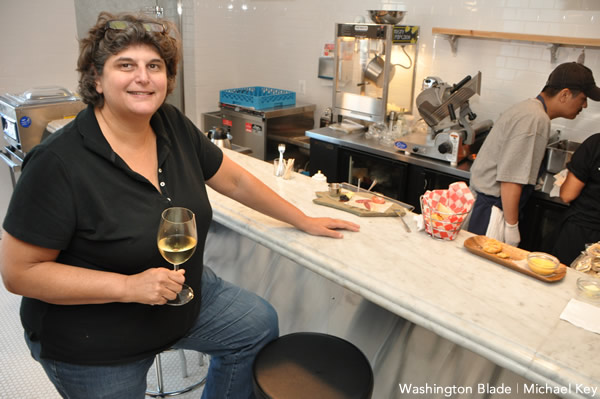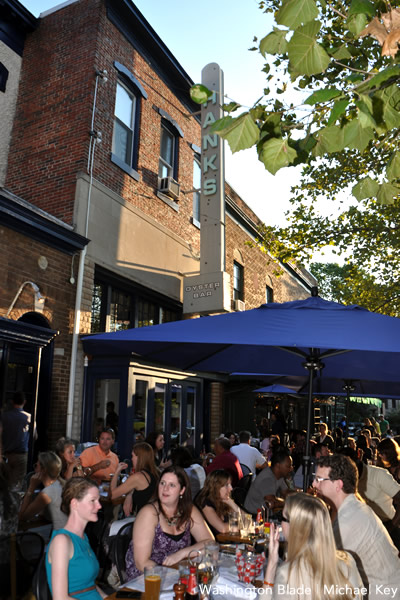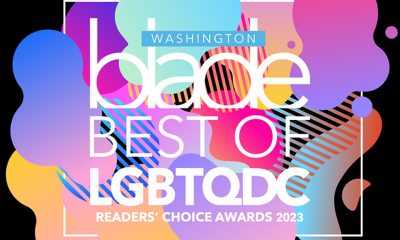Local
Lesbian restaurant owner appeals for help in dispute
Hank’s Oyster Bar forced to close part of patio during Pride

The lesbian owner of a popular seafood restaurant along the 17th Street business district near Dupont Circle is asking the community to support the repeal of a city law that she says allowed six people to force her to reduce her outdoor seating capacity from 40 to 20 customers.
Jamie Leeds, the chef and owner of Hank’s Oyster Bar at 1624 Q Street, N.W., issued a statement over the weekend informing customers and supporters that inspectors with the city’s Alcoholic Beverage Control Board ordered her on Friday night, June 8, to close half of the restaurant’s patio space.
Leeds said that the order came the day before the annual Capital Pride Parade was to travel past her patio, limiting the number of patrons who wanted to dine on the patio while watching the parade.
“This action shutting down half of our outdoor patio on the night before the annual parade was the result of one of the license protestants phoning in a complaint to the city, and occurs before we have even had a hearing before the ABC Board,” Leeds said in an open letter to the community.
“The ongoing harassment by this small band of residents is astonishing and the timing of this individual’s complaint before the annual celebration is despicable,” she wrote in her letter.
Leeds’ call for the repeal of the law that allows as few as five citizens to contest liquor license applications comes at a time when gay and straight nightlife advocates have urged gay D.C. Council member Jim Graham (D-Ward 1) to consider introducing legislation to ease what the advocates say are overly burdensome regulations pertaining to such businesses. Graham chairs the Council committee that oversees the city’s liquor laws and the agency that enforces them.
Michael Hibey, the attorney representing the six residents opposing Hank’s Oyster Bar’s use of the expanded outdoor seating, declined to comment. David J. Mallof, one of the six nearby residents who has taken a lead role in opposing Hank’s expansion of its outdoor seating, also declined to comment.
The Blade couldn’t immediately reach the other five residents opposing the termination of the voluntary agreement. They are: Alexis Rieffel, Ralph N. Johnson, Susan Meehan, Michael Fasano and Patricia E. Steele.
Fred Moosally, director of the city’s Alcoholic Beverage Regulation Administration, which oversees the ABC Board, confirmed on Monday that the inspectors responded to a complaint by a representative of the six residents opposed to the restaurant’s expansion.
But Moosally told the Blade that the call for restricting the patio’s use was in response to a May 17 D.C. Court of Appeals decision ordering the city to reinstate a document known as a voluntary agreement between Leeds and the six residents. The agreement bars Hank’s from expanding its patio or any part of the restaurant beyond the space it occupied at the time it opened in 2005.
At Leeds’ request and following an earlier hearing, the board terminated the voluntary agreement in 2010, allowing her to expand into outdoor and indoor space in an adjacent building that became vacant that year.
The six residents appealed the board’s action to the Court of Appeals. The court voided the board’s order terminating the voluntary agreement and remanded the case back to the board. It instructed the board to consider two issues the court said the board was legally required to consider but failed to do so at the time it terminated the voluntary agreement.
Moosally said ABC Board inspectors informed Leeds on June 2 during a visit to the restaurant of the court ruling and its effect of reinstating her voluntary agreement. Although he didn’t say so directly, he implied that Hank’s knew more than a week before the Pride parade that it couldn’t use the full space of the patio at the time of the June 9 parade.
Andrew Kline, a licensing counsel representing Leeds before the ABC Board, disputes Moosally’s assessment, saying he believes the board had to take “another step” of rescinding its 2010 order terminating the voluntary agreement before it could require Hank’s to give up use of the full patio.
Kline said the court decision didn’t prevent the board from allowing Hank’s to continue to use its full patio while the board deliberates over its decision, as mandated by the court, to make a determination on whether the voluntary agreement should once again be terminated.
The board scheduled a hearing on Wednesday, June 13, to address issues that the appeals court said must be resolved before the board can make a final decision on whether to retain or terminate the voluntary agreement.
The court decision was the latest development in a seven-year dispute between Hank’s Oyster Bar and the handful of nearby residents, who have contested the restaurant’s liquor license in an effort to obtain restrictions through the voluntary agreement.
Leeds says in her letter that she was pressured into signing the voluntary agreement in 2005, the year she opened the restaurant, as a condition to end a formal protest of the license by the six residents. She said the license protest could have dragged on for months, delaying her ability to obtain a liquor license and jeopardizing her ability to open her new business.
Most observers following the dispute, including LGBT activists, believe Hank’s opponents are motivated by an aversion to an “overconcentration” of liquor serving establishments on 17th Street, which the opponents say have the potential for causing neighborhood disturbances. Most observers don’t think the opponents of Hank’s expansion are motivated by anti-gay sentiment.
But many LGBT activists have teamed up with nightlife advocates in calling on the City Council to repeal the law that gives as few as five residents legal standing to challenge a liquor license and push for restrictions similar to those in the voluntary agreement signed by Hank’s.
They point out that Hank’s has never caused any problems in the neighborhood, either before or after it expanded its operations into the adjacent space in 2011.
Although the ABC Board makes the final decision on approving a voluntary agreement or approving restrictions on the operation of bars and restaurants, business owners have said a protest by a “gang of five,” as the business owners have called the protesting residents, can hold up a license for months. They say the delays result in high monetary costs for legal fees and the cost of renting spaces that can’t generate revenue until the license is approved.
One proposal offered by nightlife advocates is to eliminate the existing provision of the liquor law that gives five or more citizens authority to contest liquor licenses and restrict that authority to the elected Advisory Neighborhood Commissions. ANC’s currently have that authority.
“If you agree that allowing a small number of individuals to dictate what happens in our community is wrong, please contact ABRA; Ward 2 Council member Jack Evans; Council member Jim Graham, chair of the committee that oversees ABC [Board issues]; and Mayor Vincent Gray,” Leeds said in her open letter. “The right of a group of 5 residents to hold up a license application should be eliminated from the law.”
Leeds’ letter came two days after Mayor Gray told a joint Capital Pride-Washington Blade town hall meeting that he was concerned over the ability of just five people to block licensing applications for businesses such as restaurants.
“I don’t think a small handful of people should be given the opportunity to unreasonably hold up action on something that a preponderance of the people want to move forward on,” Gray said.
“I have always believed that most so-called ‘voluntary agreements’ are actually ‘coerced’ agreements,’” said gay activist Peter Rosenstein, who lives about two blocks from Hank’s.
“[T]his case should convince the City Council and the mayor to change the law,” Rosenstein said. “We live in a democracy and allowing a complaint by five people to determine what is seating capacity for a restaurant is clearly not democracy.”
Rick Rosendall, vice president of the Gay and Lesbian Activists Alliance and a resident of 17th Street near Hank’s Oyster Bar, characterized as “outrageous” the action by the six residents to restrict Hank’s patio usage.
“It is absurd and harmful, and D.C. Council members and Mayor Gray need to hear from people who appreciate that the neighborhood and the city are not served by allowing small, unrepresentative groups to hold everyone else hostage to their cramped, entitlement-drenched desire to turn thriving urban neighborhoods into quiet suburbs,” Rosendall said.
One of the court’s requirements is that Leeds makes a “good faith” effort to reach a new voluntary agreement with the six residents, something Leeds doesn’t think is possible.
“[W]e did try to work this out with those opposed to us back when we first sought termination of the VA, but they refused to meet,” she said. “Since the Court of Appeals decision was reached, we offered to address their concerns with a more limited VA, but they insist we cut our outdoor occupancy by 25 percent, even though there have been no complaints.”
The second requirement is to show that the neighborhood has changed since the time the agreement was signed in 2005 that would support terminating the agreement. Kline said one key change that has occurred is the ABC Board repealed part of a longstanding 17th Street moratorium on new liquor licenses that prevented bars and restaurants from laterally expanding to adjacent buildings or properties.
The Dupont Circle Advisory Neighborhood Commission, which supports allowing Hank’s to expand its patio, supported the lifting of the moratorium on lateral expansion.
The president of the Dupont Circle Citizens Association, Doug Rogers, issued a statement on Monday denouncing the ABC Board’s decision to shut down Hank’s expanded patio operation, saying the board should have waited until after its scheduled hearing on June 13.
“What is even more infuriating is that two toxic people in our neighborhood are allowed to shut down part of a legitimate business and force them to spend thousands of dollars in legal fees,” Rogers said in his statement. “Their ability to do this should be eliminated from D.C. law, and I urge Mayor Gray and the D.C. Council to reform D.C.’s archaic regulatory laws.”
Virginia
Norfolk transgender resource center vandalized
Anti-trans graffiti spraypainted onto Southeastern Transgender Resource Center’s windows
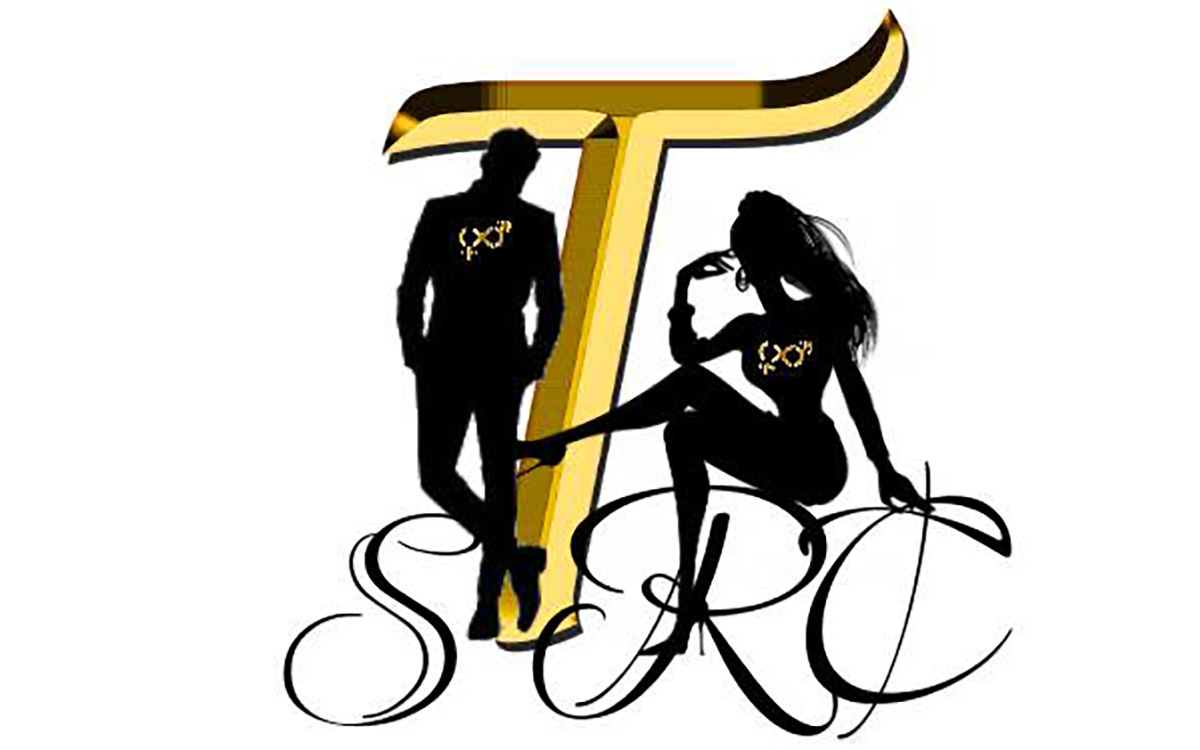
The Norfolk Police Department is investigating the vandalism of a transgender resource center’s building.
Tarena Williams, founder of the Southeastern Transgender Resource Center, told WAVY that someone spraypainted anti-trans graffiti on the windows of her organization’s offices on Sunday or Monday morning. Williams told the Hampton Roads television station that seeing the messages was like “walking into hell.”
“I opened up STRC, even the Lamina House,” she told WAVY. “I opened up that to get away from those types of words. This is a place you can come to get away from that, but to see that sprayed over the window. It’s kind of like you are walking into hell. … To be honest, I was like in shock.”
Authorities are investigating the vandalism.
West Virginia
Appeals court strikes down W.Va. transgender athlete ban
Ruling finds law violates students’ constitutional rights, Title IX

BY LORI KERSEY | The 4th U.S. Circuit Court of Appeals has struck down West Virginia’s ban on transgender athletes, finding the law violates trans students’ rights under the Equal Protection Clause of the constitution and Title IX, a federal civil rights law prohibiting discrimination based on sex in education programs.
The case, B.P.J. vs. the West Virginia Board of Education, was filed in May 2021 on behalf of Becky Pepper-Jackson, a 13-year-old trans middle school student and track athlete who would be barred from participating if the ban is upheld. Pepper-Jackson is represented by the American Civil Liberties Union, the American Civil Liberties Union of West Virginia and Lambda Legal.
In April 2021, West Virginia Gov. Jim Justice signed into law a bill prohibiting trans women and girls in the state from participating in sports that align with their gender identity. The U.S. Court of Appeals in February 2023 blocked the state from removing Pepper-Jackson from her school’s track and field team as legal advocates appealed a lower court’s ruling upholding the ban.
In Tuesday’s ruling, Judge Toby Heytens wrote that offering Pepper-Jackson the “choice” between not participating in sports and participating only on boys teams is not a real choice.
“The defendants cannot expect that B.P.J. will countermand her social transition, her medical treatment, and all the work she has done with her schools, teachers and coaches for nearly half her life by introducing herself to teammates, coaches and even opponents as a boy,” the judge wrote.
“By participating on boys teams, B.P.J. would be sharing the field with boys who are larger, stronger, and faster than her because of the elevated levels of circulating testosterone she lacks,” he wrote. “The Act thus exposes B.P.J. to the very harms Title IX is meant to prevent by effectively ‘exclud[ing]’ her from ‘participation in’ all non-coed sports entirely.”
In a statement Tuesday, Joshua Block, senior staff attorney for the ACLU’s LGBTQ and HIV Project, called the court’s ruling “a tremendous victory for our client, transgender West Virginians and the freedom of all youth to play as who they are.”
“It also continues a string of federal courts ruling against bans on the participation of transgender athletes and in favor of their equal participation as the gender they know themselves to be,” Block wrote. “This case is fundamentally about the equality of transgender youth in our schools and our communities and we’re thankful the 4th Circuit agreed.”
“We hope today’s ruling sends a message of hope to the trans youth of West Virginia,” Aubrey Sparks, legal director of the ACLU of West Virginia, said in the statement. “And a message of warning to politicians who continue to dehumanize this vulnerable population.”
West Virginia is one of 21 states that have banned trans student-athletes over the last three years, according to the ACLU.
In a statement Tuesday, West Virginia Attorney General Patrick Morrisey vowed to defend the ban and said he is “deeply disappointed” in the decision.
“The Save Women’s Sports Act is ‘constitutionally permissible’ and the law complies with Title IX,” Morrisey said. “I will keep fighting to safeguard Title IX. We must keep working to protect women’s sports so that women’s safety is secured and girls have a truly fair playing field. We know the law is correct and will use every available tool to defend it.”
******************************************************************************************

Lori Kersey is a reporter with a decade of experience reporting in West Virginia. She covers state government for West Virginia Watch.
******************************************************************************************
The preceding article was previously published by the West Virginia Watch and is republished with permission.
Nonprofit, nonpartisan, independent journalism not hidden behind a paywall. Mountaineers are always free, and so is West Virginia Watch.
West Virginia Watch is part of States Newsroom, the nation’s largest state-focused nonprofit news organization.
District of Columbia
Reenactment of first gay rights picket at White House set for April 17
Event marks 59th anniversary of historic push for gay rights in nation’s capital
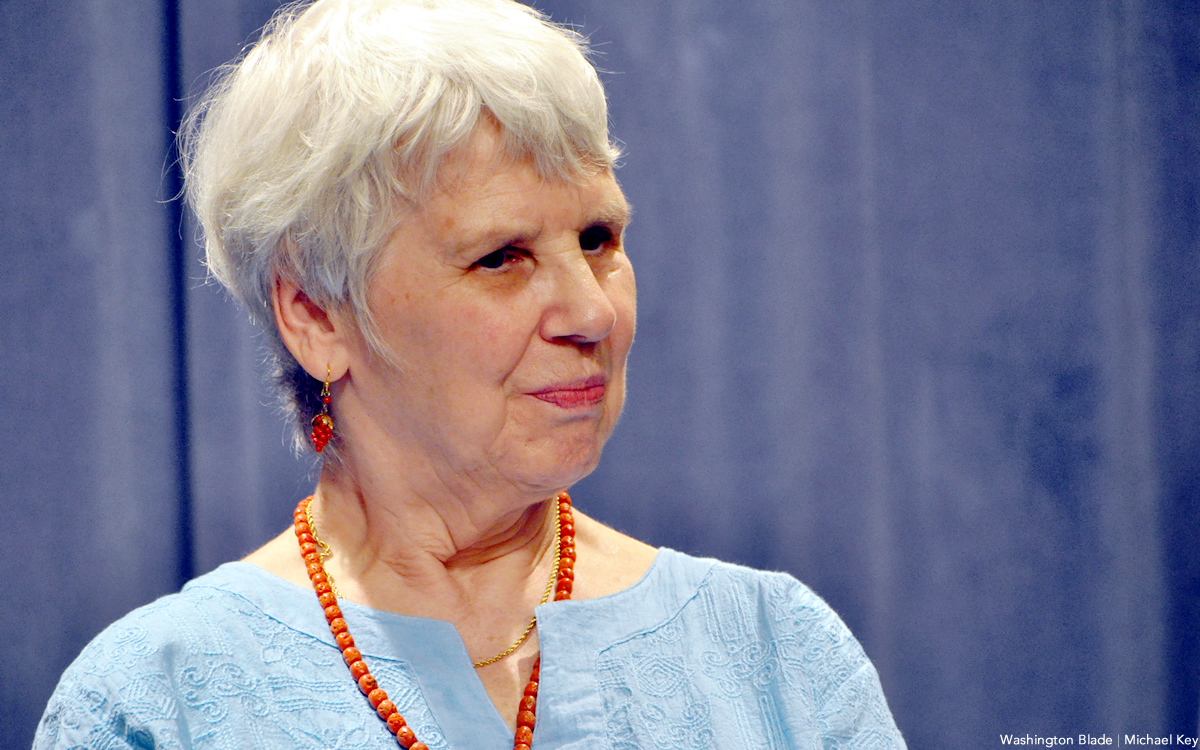
D.C.’s Rainbow History Project announced it will hold a reenactment on Wednesday, April 17, of the historic first protest for gay rights in the form of a picket line in front of the White House that took place on that same day in 1965.
In a statement released last week, Rainbow History Project says the reenactment will mark the 59th anniversary of an event that is credited with bringing attention for the first time to the federal government’s longstanding discrimination against a minority group referred to then as homosexuals or gays and lesbians.
The statement notes that the 1965 event was organized by the Mattachine Society of Washington, D.C., the first politically active LGBT organization in the nation’s capital founded by local gay rights pioneer Frank Kameny.
“The picket took place on the White House sidewalk, Lafayette Park, 1600 Pennsylvania Ave., on April 17, 1965,” the statement says. “For exactly one hour, from 4:20 p.m. to 5:20 p.m., members of the Mattachine Society of Washington walked in a circle, non-stop, in silence, carrying posters of their demands,” the statement continues.
“The White House picket is the origin story for public demonstrations for gay rights in the U.S., and the origin story for Pride Marches and the annual LGBTQ Pride celebrations which occur across the globe,” according to the statement.
It says those picketing in the April 1965 event, which included Kameny and longtime local D.C.-area lesbian activist Lilli Vincenz, both of whom held doctorate degrees, called on the government to adopt the Mattachine Society of Washington’s four major demands: an end to the exclusion of homosexuals from federal government employment; an end to the ban on gays and lesbians from serving in the U.S. military; an end to the “blanket denial” of security clearances for gay people; and an end to the “government refusal to meet with the LGBTQ community.’
Among those who chose not to respond to the request for a meeting was President Lyndon B. Johnson, who occupied the White House at the time of the 1965 picketing.
Vincent Slatt, the Rainbow History Project’s director of archiving and one of the lead organizers of the April 17 reenactment event, said the event is aimed, among other things, at drawing attention to how far the LGBTQ community has come since 1965. He said the event is not in any way a protest of the administration of President Joe Biden and Vice President Kamala Harris, who Slatt called staunch supporters of the LGBTQ community.
“We are just reenacting this historical event and pointing out how far we’ve come,” Slatt told the Washington Blade. “If you think about what it means in 1965 when these people were protesting and LBJ would not even respond to them. And now, we are at a place where Vice President Harris speaks on a stage at Capital Pride.”
The Rainbow History Project statement notes that the reenactment event will also be held in honor of Kameny, who died in 2011, and Vincenz, who passed away in 2023, both of whom participated in a similar reenactment event in 2008.
Among those who will be participating in this week’s reenactment on April 17 will be longtime local LGBTQ rights activist Paul Kuntzler, who is the only known surviving person who was among the White House picketers at the April 1965 event. Kuntzler will be carrying a replica of his own picket sign he held at the 1965 event, the statement says.
It says Rainbow History Project volunteers will also carry replicas of the original protest signs and hand out literature explaining the picket to passersby and tourists.
Similar to the 1965 event, the reenactment picketing at the White House will begin on April 17 at about 4:15 p.m., according to Slatt of the Rainbow History Project.

